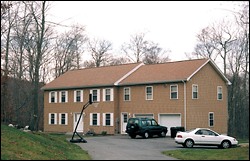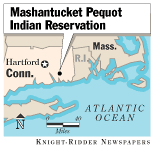 |
 |
 |
| Your account | Today's news index | Weather | Traffic | Movies | Restaurants | Today's events | ||||||||
|
December 4, 1996
Federal aid for the wealthy
It's the sound of success for the Mashantucket Pequot Tribe, whose investment in gaming four years ago has turned into a billion-dollar business.
Poverty was wiped out virtually overnight when the tiny tribe
opened the doors to this hotel-and-entertainment complex on its
reservation in the woodsy countryside southeast of Hartford.
The tribe's 383 members get a generous share of the multimillion-dollar profits. They won't reveal how much, but Pequot spokesman Bruce MacDonald says, "There are no low-income tribal members anymore." However, the financial boon hasn't stopped the tribe from taking and spending a $1.5 million federal handout: a grant from the U.S. Department of Housing and Urban Development to build 15 houses for tribal members. The money is earmarked for low-income Native Americans, and would be a godsend for the nation's many impoverished tribes. But $1.5 million was a drop in the bucket for the Pequots, not enough to build the upscale homes its members wanted. So the tribe added a million dollars of its own to make the houses bigger and better. How this wealthy Native-American community wound up with a federal grant for the needy is a tale of tribal chutzpah and bureaucratic complacency.
And it's another example of what The Seattle Times found repeatedly in a six-month investigation of HUD's Indian-housing program: that the department's 1992 decision to dramatically reduce oversight of the program has invited waste and abuse.
"The Great Spirit has not smiled on everyone in Indian Country as here," Pequot Tribal Manager Leon Jacobs said. "And there's still a great need out there." Jacobs knows. Before he joined the Pequot management team in late 1994, he was a regional administrator for HUD's Office of Native American Programs, responsible for awarding tribal-housing grants in the East. Now he oversees a tribe that has enough money to hand out grants of its own — $2 million to the Special Olympics and $10 million to the Smithsonian Institution, for example. It wasn't that way in 1991, when the tribe applied to Jacobs' office in Chicago for its fourth development grant since the late 1970s. The casino was under construction, and many tribal members needed basic housing. "At the time of the grant, there was no question of eligibility," said Jacobs, a Cheraw Indian. "But construction was long and drawn-out." When Jacobs joined the Pequots in October 1994, the housing authority had not yet used any money from its grant, which sat reserved in a U.S. Treasury account. By then, the tribe's fortunes had already turned. Residents of older HUD housing were buying their boxy little homes from the housing authority and adding two-story wings, two-car garages and striking architectural flourishes. The tribe used its own money to build homes for its elderly and to finance loans for its well-to-do. Jacobs said he approached HUD officials about canceling the low-income-housing grant, because it was no longer needed. "There was a discussion relative to returning the money," he said. "We asked, if we returned it would another tribe benefit? The answer at that time was no. It would've been money lost to Indian Country." HUD had no authority to reassign the money to another tribe, he said. Because the money would go back to the federal government, the tribe decided to keep it. HUD didn't try to cancel grant
The housing authority took the full $1.5 million in November 1994, and the last of the 15 houses is now under construction. Dominic Nessi, deputy assistant secretary for the Office of Native American Programs, said he recalled an informal inquiry by Jacobs about canceling the grant. The tribe never followed through, he said. "We'd love to get it back," he said. But HUD officials made no move to cancel the grant on their own, although they had the opportunity. Jacobs could have canceled it himself while still at HUD, because the tribe took so long to turn in the necessary paperwork to collect the money. The funding agreement wasn't signed by Jacobs and the tribe until June 1994 — nearly three years after HUD approved the grant. It's still unclear whether the paperwork was in place even then. HUD officials say they can't find the usual backup documentation for the agreement. The documentation couldn't be found at the housing-authority offices either, according to a 1994 financial audit. Among the missing records: proof that the people selected to get houses were still low-income. Despite those problems and the newfound wealth of the tribe, the audit said, HUD officials "encouraged the housing authority to draw down the funds." Jacobs said he didn't recall the specifics but would have relied on his staff's recommendation in signing off on the funding agreement. With an agreement in hand, the Pequots were in no hurry to collect. They had already started building the houses with their own money and hardly needed tax dollars to finish the job. They collected the full $1.5 million all at once in November 1994 after hiring Jacobs. The project was 95 percent complete. It wasn't until a year later that a new HUD regional administrator — who has since left — sent a polite letter to the Pequots about the missing records noted in the audits. "You may wish to revisit the questioned cost," he wrote to the housing authority. The "questioned cost" was the entire $1.5 million grant. Jacobs said there really was nothing much HUD could have done at that point. The tribe already had the money. HUD could have blacklisted the housing authority from funding for a couple of years, but that wouldn't have mattered to the Pequots: They're now too wealthy as a group to qualify for any more money. "This is our last project," Jacobs said. "Since the tribe was not applying for any future funding, it became moot. That was HUD's dilemma." Not all casino income is reported
The Pequots are not the only tribe whose newfound wealth has posed a problem for HUD. The Yavapai Apache tribe at the Fort McDowell reservation in Arizona — blessed by its close proximity to Scottsdale — has also benefited from a tremendously successful casino. The tribe decided to buy its housing authority's 64 HUD-subsidized homes and to close the agency. The tribe was willing to pay HUD for the houses, but HUD officials said they had no standing to accept money. A change in the law in 1987 vested ownership fully with the housing authority and not with HUD. At a loss over whom to pay and how, the housing authority sold the houses to its now-prosperous members for $1 each and forgave $1.1 million in delinquencies and monthly payments — money that had been owed to the federal government. HUD struggles to enforce income rules. Once residents move into a subsidized home, they can stay even if their incomes rise above poverty level. But their monthly payments are supposed to go up, too: Those renting HUD properties pay 30 percent of their incomes and those buying HUD homes pay 15 percent. However, some housing authorities have been reluctant to include profit-sharing from tribal gaming when calculating residents' monthly payments. HUD contends they must. Depending on the tribe and the year, annual per-capita payments range from a couple hundred dollars to a couple hundred-thousand dollars a year. In Wisconsin, the Lac du Flambeau tribal council passed a resolution specifically exempting gambling profits from its members' incomes for federal-assistance purposes, before HUD officials set tribal officials straight. But other housing authorities aren't as upfront about discounting gaming income. They do it indirectly by not updating their residents' income statements as required under federal regulations. Gaming is a growing issue in Indian housing — there are gaming operations at half the 200-plus reservations with housing authorities. HUD encourages tribes to build casinos and gives economic-development grants to help them. The casinos have helped, but not enough to wipe out poverty in the vast majority of tribes. Most have too many members or too remote a location for gaming profits to make that kind of difference. As a result, many use a portion of their profits for community purposes, such as health clinics and housing for the elderly, instead of per-capita payments to members. Tribes such as the Pequots, though, have literally hit the jackpot. Jacobs predicted further success stories on other reservations, and urged a change in regulations to allow tribes whose fortunes change to donate their federal-grant money to those who need it. History is threatening to repeat itself several miles south of the Foxwoods casino, in the same well-populated corridor between New York City and Boston. The Mohegans, a Connecticut tribe of 1,100 members, recently opened a casino that is already drawing large crowds and an estimated $1 million a day in slot-machine revenue.
The tribe also has just won its first HUD project, a $2.2 million grant to build 15 rental houses for low-income members.
|
|
||||||||||||||||||||||||||||||||||||||||||||||||||
seattletimes.com home
Home delivery
| Contact us
| Search archive
| Site map
| Low-graphic
NWclassifieds
| NWsource
| Advertising info
| The Seattle Times Company



 June 1994: Paperwork authorizing the tribe to begin spending the money is signed by Leon Jacobs, right, regional administrator of HUD's Office of Native American Programs in Chicago.
June 1994: Paperwork authorizing the tribe to begin spending the money is signed by Leon Jacobs, right, regional administrator of HUD's Office of Native American Programs in Chicago.